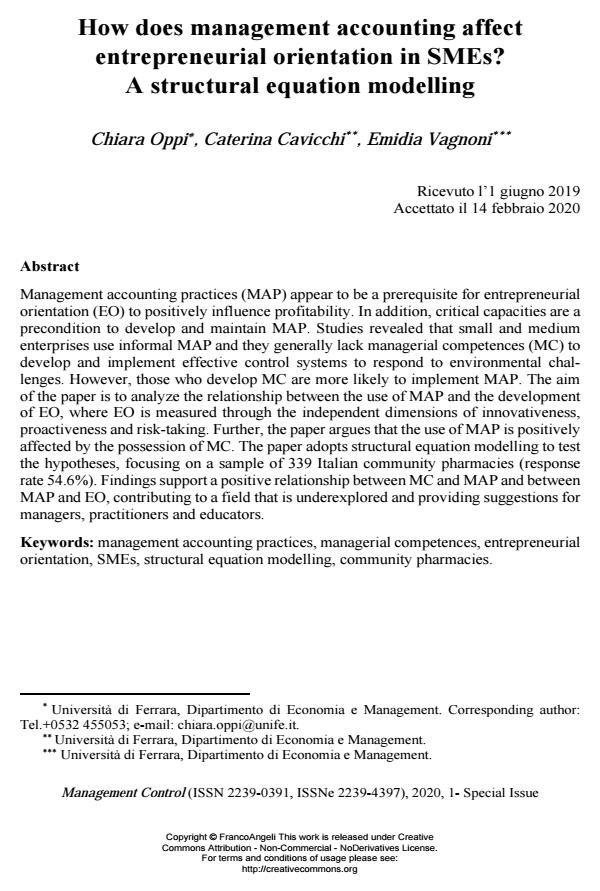How does management accounting affect entrepreneurial orientation in SMEs? A structural equation modelling
Titolo Rivista MANAGEMENT CONTROL
Autori/Curatori Chiara Oppi , Caterina Cavicchi, Emidia Vagnoni
Anno di pubblicazione 2020 Fascicolo 2020/Suppl. 1
Lingua Inglese Numero pagine 16 P. 63-78 Dimensione file 257 KB
DOI 10.3280/MACO2020-001-S1005
Il DOI è il codice a barre della proprietà intellettuale: per saperne di più
clicca qui

FrancoAngeli è membro della Publishers International Linking Association, Inc (PILA), associazione indipendente e non profit per facilitare (attraverso i servizi tecnologici implementati da CrossRef.org) l’accesso degli studiosi ai contenuti digitali nelle pubblicazioni professionali e scientifiche.
Management accounting practices (MAP) appear to be a prerequisite for entrepreneur-ial orientation (EO) to positively influence profitability. In addition, critical capacities are a precondition to develop and maintain MAP. Studies revealed that small and me-dium enterprises use informal MAP and they generally lack managerial competences (MC) to develop and implement effective control systems to respond to environmental challenges. However, those who develop MC are more likely to implement MAP. The aim of the paper is to analyze the relationship between the use of MAP and the devel-opment of EO, where EO is measured through the independent dimensions of innova-tiveness, proactiveness and risk-taking. Further, the paper argues that the use of MAP is positively affected by the possession of MC. The paper adopts structural equation modelling to test the hypotheses, focusing on a sample of 339 Italian community pharmacies (response rate 54.6%). Findings support a positive relationship between MC and MAP and between MAP and EO, contributing to a field that is underexplored and providing suggestions for managers, practitioners and educators.
Parole chiave:Management accounting practices, managerial competences, entrepreneur-ial orientation, SMEs, structural equation modelling, community pharmacies.
- Business continuity and planning effectiveness: An empirical analysis of Italian manufacturing SMEs Francesca Sgrò, Federica Palazzi, Massimo Ciambotti, in MANAGEMENT CONTROL 3/2022 pp.89
DOI: 10.3280/MACO2022-003005
Chiara Oppi , Caterina Cavicchi, Emidia Vagnoni, How does management accounting affect entrepreneurial orientation in SMEs? A structural equation modelling in "MANAGEMENT CONTROL" Suppl. 1/2020, pp 63-78, DOI: 10.3280/MACO2020-001-S1005